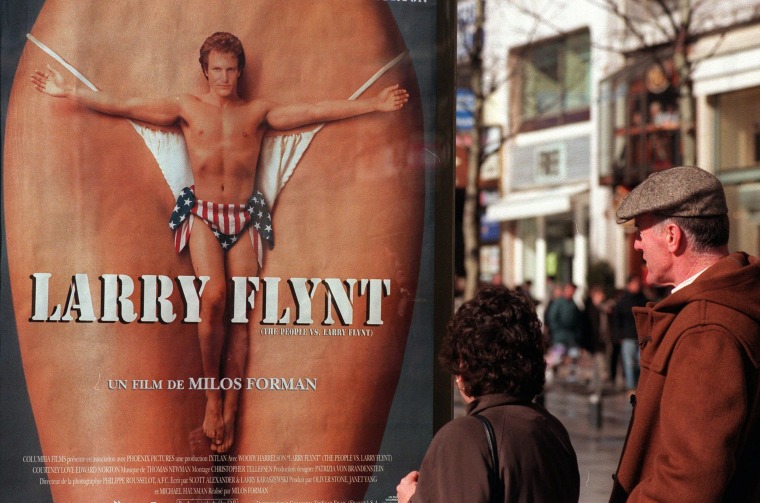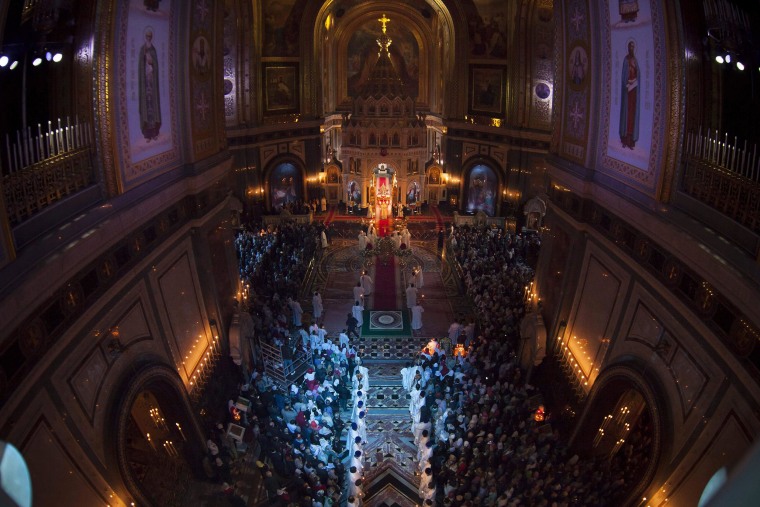MOSCOW — The cancellation of a racy interpretation of a classic opera has turned the spotlight on muscle-flexing by the conservative Orthodox Church in previously atheist Russia.
The state-owned Novosibirsk Opera and Ballet Theater premiered a revamp of Richard Wagner's 1845 “Tannhäuser” in December, with the title character being changed to a director filming a movie about Christ having sex.
Stage decorations included posters modeled on an ad for “The People Vs. Larry Flynt,” the 1996 film starring Woody Harrelson that eulogized the pornographer and First Amendment rights activist. However, the new adaptation of the opera's version showed an image of Jesus crucified on a vagina.

The head of the Novosibirsk Orthodox Diocese last month complained about the production to prosecutors, saying it “misuses ecclesiastic symbols.” However, he admitted to having not seen the opera.
On March 29, Russia’s Ministry of Culture fired the theater’s head, Boris Mezdrich, who had commissioned the performance.
The opera’s new boss, so-called “fruit king” Vladimir Kekhman — a tycoon who made a fortune in banana imports — promptly dropped the play.
The Kremlin’s spokesman denied censorship, but said that the government was entitled to expect “correct performances” from theaters on the state payroll.
Conservatives have previously successfully lobbied for a ban on concerts and performances deemed un-Christian, such as Marilyn Manson, death metal group Cannibal Corpse and even a staging of “Jesus Christ Superstar.”
Modern art exhibits deemed offensive to Christianity have also been picketed, and some of Russia's 85 regions have been banned “satanic” Halloween festivities.
Perhaps the oddest instance of church censorship saw an art group give up plans to light up the “Eye of Sauron” installation over Moscow to mark the release of “The Hobbit: The Battle of the Five Armies” in December. The church had dubbed the project “demonic.”
"We are a secular state with strong secular traditions"
The latest bout of public prudery signaled by the opera's axing follows years of warming relations between the state and the church.
President Vladimir Putin has courted the country’s Orthodox hierarchy since he came to power 15 years ago. His attendance at Easter Mass at the Christ the Savior Cathedral in Moscow is broadcast on state television annually.
The admiration appears to go both ways. Patriarch Kirill, the head of the Russian Orthodox Church, endorsed his most recent bid for high office in 2012.
According to political analyst Dmitry Oreshkin, the Kremlin is hoping to boost his legitimacy by allying with the Christian establishment.
“The regime needs a grand idea — any grand idea — to sell to the populace. This will make the people in power its priests, and therefore above criticism,” Oreshkin told NBC News.
The deepening religiosity at the top of society reflects increased devotion among Russians at large. The number of people identifying themselves as Orthodox Christian rose to 68 percent in 2013, up from 17 percent in 1989, according to independent pollster Levada.
Religious activism has also stepped up in recent years.
In 2012, members of the all-woman punk band Pussy Riot were convicted of hooliganism after performing an anti-Putin song in Moscow’s Christ the Savior Cathedral.
The following year, Russia passed a Kremlin-backed law that criminalizes “offending religious sentiment.”
The church has happily capitalized on the regime’s ideological hunger, counting on state support in return for echoing the Kremlin’s “hatemongering,” Orthodox priest Andrei Kurayev said.
In return, the Kremlin has handed back lavish real estate the church lost to the Bolsheviks in 1917, and even introduced voluntary religious education classes in schools.
But the various crack downs may end up hurting the church, according to experts.
“The church is being used as an ideological tool, but it does not help its popularity,” said Roman Lunkin of prominent religious studies pollster Sreda.
Kurayev, a well-known theologian and one of the few dissenting voices in the church, believes that this merging of state and church can only go so far.
“We are a secular state with strong secular traditions,” he said. “And even believers are growing tired of this conflict.”

Indeed, while a majority identify as Orthodox, only 8 percent of those polled by Sreda had visited church at least once a month.
So conservative protesters remain a minority, and most Russians are simply not involved in religious affairs — the church’s real problem, according to pollster Sreda's Lunkin.
Both he and Kurayev said the state is unlikely take a campaign against the church’s alleged critics beyond a few show trials, fearing the clergy will gain too much power.
“There can only be one bear in the lair,” Kurayev said.